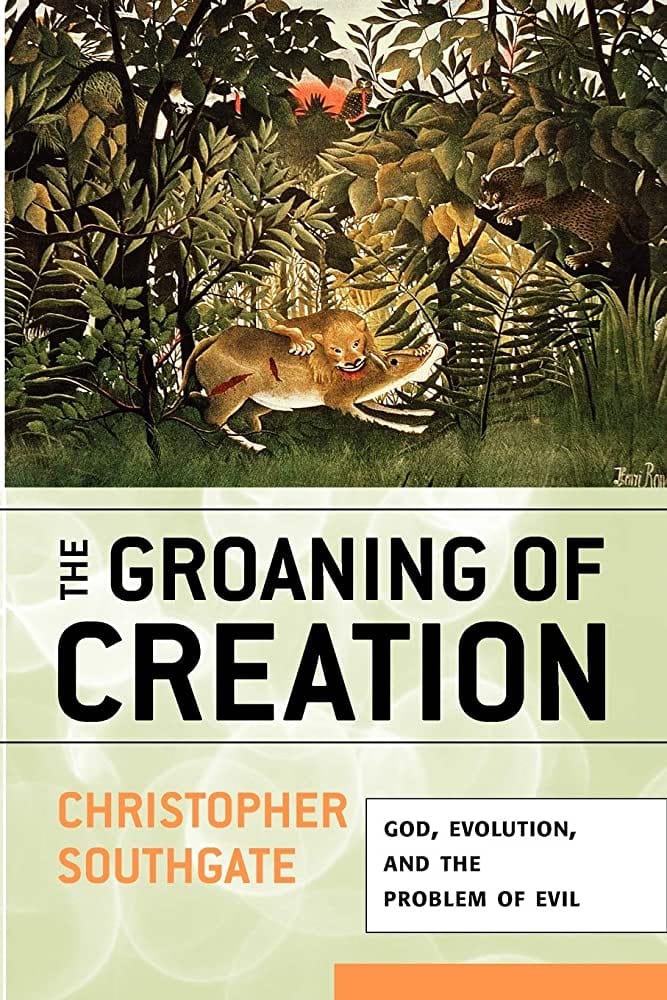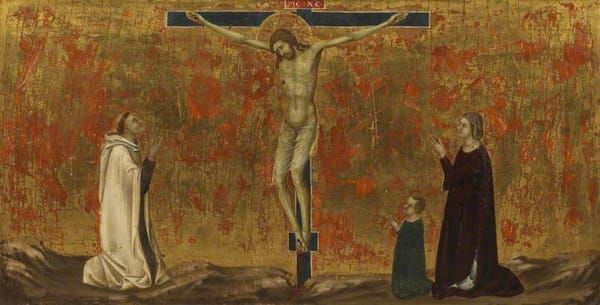Animal Suffering and What Christopher Southgate Missed

I’m only responding fifteen years late, but Christopher Southgate’s book The Groaning of Creation: God, Evolution, and the Problem of Evil (Westminster John Knox Press, 2008) was moving to me with its rare level of concern for animal suffering. It is a profoundly thoughtful book with many insights to recommend it. As my title suggests, however, I’m really just using his book as an excuse to complain. This is not fair to Southgate at all, but I do have a concern to get off my chest regarding the book.
First, Southgate takes the issue of animal suffering so seriously that he finds it necessary to reject any doctrines of fallenness (either human or angelic) because he does not want the responsibility of humans for this world to be “diluted by invoking human or angelic blame or mighty demonic powers” (35). He also says that “a Christian theology of creation must” take seriously the Genesis 1 narrative that everything came to be through “the fiat of God” and that “divine power has shaped all the matter and mechanisms of the cosmos” (32–34). Southgate, who is publishing with Westminster John Knox after all, is stuck in the typical modern idioms of fiat (in the scholastic voluntarism that elevated the power of the will over the vision of the nous), machine, and mechanism as well as being under the typical misconception of Christians these days that the human fall is all about who is to “blame.” Leaving the issues of voluntarism, will, and noetic vision aside for another day, I’ll say something briefly about the problem of blame. Traditionally, the fall was always understood as a shared condition of brokenness and sickness and not as any kind of legal guilt or blame. Properly understood, the human fall is what holds us most profoundly responsible for our entire cosmos. David Bentley Hart, in The Doors of the Sea, points to our place as the methorios (boundary, frontier, or priesthood) that binds us to our world:
It is a patristic notion (developed with extraordinary profundity by Maximus the Confessor) that humanity was created as the methorios (the boundary or frontier) between the physical and the spiritual realms, or as the priesthood of creation that unites earth to heaven, and that thus, in the fall of man, all of material existence was made subject to the dominion of death. (63)
Not only is it our indefatigable bond with our entire human world that means that the fall is as horrible as it is, but—as John Behr has pointed out—the fall is only visible insofar as we gain a vision of Christ and his resurrection. Paul, one of the most educated of Jewish scholars, had no concept of a fall before his encounter with the risen Christ, and death was not widely considered an enemy before Christ. Of course death would not be considered an enemy as who could seriously consider its destruction? However, this is very much the power of the fall and the power of Christ in exposing this world as fallen and in giving us the authority and vision to work against death itself. The doctrine of a fall is not about punishment for sin as we have been so sadly led to believe, and it does not dilute our responsibilities by shifting “the blame.” As it turns out, responsibility comes in proportion with the vision that you possess, and a recognition of fallenness comes only insofar as we can see the risen Christ. Really, seeing fallenness means seeing the depth of need in the light of our greatest means of offering help. As Hart argues in The Christian Revolution and Its Fashionable Enemies (to name only the subtitle which is what Hart himself actually chose), the Christian faith (moving the hearts and hands of a few, generally unsung, saints) has given us countless practical onslaughts on the brokenness and horror of this world in the forms of hospitals, learning, agriculture, and fine arts (albeit only slowly and with many backwards steps).
Enough of that, however, I do want to go on about what it means to learn to see death as the enemy as we learn from Christ how death can be defeated, but I must continue, machine like, to my second petty gripe against Southgate. He has the audacity to critique David Bentley Hart but without doing so directly. In his “Introduction,” Southgate pays Hart a long and heartfelt compliment with an extended quotation and reflection on the power of Hart’s conviction (drawing upon Dostoyevsky) with regard to the inexorable nature of evil and suffering in this world and the way in which this must silence theodicies (13-14). However, as Southgate builds up to his final point in “2.6 Doing Without a Fall from Paradise” (28-35), he brushes aside Hart without naming him at all:
The tectonic movements that caused the Indian Ocean tsunami is an example of those processes that have made the earth the lovely place that it is, and should not be regarded as in any way demonic. (33-34)
This obvious reference to Hart’s book The Doors of the Sea (that Southgate quoted so glowingly a few pages earlier) comes amid several other examples of scholars named by Southgate (i.e. T. F. Torrance and Clark Pinnock) as he dismisses each of their appeals to fallen or malevolent angelic powers as having anything to do with suffering in this world. Of course, it makes perfect sense to love some aspects of a great book like The Doors of the Sea while firmly disagreeing with others, but I still prefer that Hart get the same treatment (by name) as Southgate gave to Torrance and Pinnock. (And one has to suspect if there was a touch of strategy and true wisdom in Southgate’s approach, as well, given Hart’s reputation for withering responses to almost all of his critics. Although I haven’t followed closely enough to know if perhaps Southgate and Hart have engaged with each other since this book fifteen years ago.)
My real interest, however, has to do with what Southgate fails to reject because he evidently fails to see it. Hart has been widely mistaken for pinning the ultimate “blame” for cosmic suffering upon fallen angels. Even Fr. Al (Aidan) Kimel—the great theological reader, author, blogger, and friend of Hart—had this misunderstanding of Hart (as he noted here). It’s worth seeing more of Al’s social media inquiry from November 14, 2020:
Yesterday I learned that contrary to what I had believed for several years, David Hart does not locate the origin of evil in the angelic fall. I don’t know why I thought he did. I probably misinterpreted a line or two in Doors of the Sea. So I wrote David and asked him to clarify. He wrote back: “I think Origen was right. And I think John Behr is right about Origen.”
It is easy to see how this misunderstanding could arise. Hart has several passages such as these:
Very few of those who live at the upper periphery of the Indian Ocean doubt that, among the many supernatural powers keeping watch over those waters—benign or capricious, transcendent or local, omnipotent or merely mighty—there is at least one who is able to govern their tides and turbulences and to keep the sea within its appointed bounds. (2)
[Christians believe] in an ancient alienation from God that has wounded creation in its uttermost depths and reduced cosmic time to a shadowy vestige of the world God truly intends, and enslaved creation to spiritual and terrestrial powers hostile to God. (22)
From this book and many of Hart’s other writings, it is obvious that he considers angelic powers to have gotten tangled up with the human fall in various ways (either through incompetence or a malicious desire on their own part to take advantage of the human fall). It is easy to come to the mistaken conclusion, therefore, that Hart falls in line with the typical sequence that Christians imagine: an angelic fall leads to a human fall as the fallen angels tempt the poor innocent humans into their own human fall. However, Hart rejects this way of seeing the relationships between these categories (as well as much about the categories themselves), and this should not be too surprising for the close reader.
First of all, any simple language of sequence is obviously out of place when dealing with various kinds of time in relation to the eternity of God. Second, there is something about the creation of humanity in the divine image that puts it at the center of everything regardless of what “order” we might imagine. If various angels or fairies or dogs or other creatures have had falls of their own (and Hart does share at some length about the fall of dogs as recounted by Roland in Roland’s book), these are fundamentally none of our business. (Famously, C. S. Lewis and Aslan have some wisdom to share along these lines.) In another sense, however, the creation of humans in the divine image somehow sits at the point of contact between all other creatures, as the methorios (boundary or hinge) that Hart mentions from Maximus (cited above, page 63). Humanity, to be itself, somehow needs to perceive and love all the other parts of creation as themselves. Therefore, the human fall somehow touches all other falls and is entangled with them to some degree. In fact, the human fall even pulls unfallen angels along with it and involves them in labors and battles over our human plight.
All of this may sound rather grandiose or melodramatic or utterly impractical, but it really is not. We’ve been trained in modern times to disdain myth as a carrier of truth and a teacher of the realities that we fail to see despite our being surrounded by them in the humdrum of everyday life. All of this is about how we receive and care for the gift of the earth beneath our feet, the air we breathe, the dog who licks our hand, the child who wakes us in the morning, or the stranger suffering beside us. Regardless of how well we recognize or like it, learning to see dogs, angels, wildflowers, fairies, landscapes, and people is all intertwined and interdependent for us as humans. We are the image of God that binds all things together by emptying itself before all things so that it might both fill them and receive them with rejoicing. This is why God is human and why a mighty star attended the birth of a child in danger of facing life with no earthly father, carried by a displaced and homeless mother, laid to sleep among animals in a feed trough.
What Southgate failed to see is that Hart is not placing the blame for cosmic suffering on fallen angels but resting the responsibility as squarely and positively as possible on humanity by means of a distinctly Christian insight revealed to Paul by his encounter with the resurrected Christ. Southgate never once mentions the concept of an atemporal or metaphysical human fall, but this is the central issue in Hart’s vision. When Hart writes about “the fall of rational creation,” he is talking about the human fall, the failure of the methorios or hub of connection holding all of creation together by means of vision, affection, and delight for all realms, from mineral to angelic. Although Hart often references some admixture of inept and malevolent angelic powers in close proximity to the fall of Adam, the point is never that angels are to blame. The point is that humans must follow the example of Christ and defy death itself with our every moment of wonder and gratitude as well as our every free choice and active response to the gift of this world. This is what is behind passages such as these from Hart:
The fall of rational creation and the conquest of the cosmos by death is something that appears to us nowhere within the course of nature or history; it comes from before and beyond both. We cannot search it out within the closed totality of the damaged world because it belongs to another frame of time, another kind of time, one more real than the time of death. …It may seem a fabulous claim that we exist in the long grim aftermath of a primeval catastrophe—that this is a broken and wounded world, that cosmic time is a phantom of true time, that we live in an umbratile interval between creation in its fullness and the nothingness from which it was called, and that the universe languishes in bondage to the “powers” and “principalities” of this age, which never cease in their enmity toward the kingdom of God—but it is not a claim that Christians are free to surrender. (“The Devil’s March: Creatio ex Nihilo, the Problem of Evil, and a Few Dostoyevskian Meditations.” Theological Territories. Notre Dame, 2020. pp. 79–80.)
When this is read with understanding for the vision of human responsibility in the form of a life given to wonder, gratitude, and tireless loving action on behalf of our world, then Southgates dismissal of any doctrine of a human fall no longer holds up. Hart’s recognition of a human fall outside of fallen history is a clarion call to visionary action and not a copout that relinquishes humanity from any responsibility for our world “by invoking human or angelic blame or mighty demonic powers” (35). And it certainly is not “a Christian theology of creation” that says that everything in this fallen world came to be by “the fiat of God” and that “divine power has shaped all the matter and mechanisms of the cosmos” (32-34). Hart would agree that everything in this world participates, from the very core of its being, in the beautiful and good work of the timeless Creator, but everything in our fallen human world is also fractured, incomplete, and subject to all manner of distortion, frailty, and abuse because of the atemporal human fall. It is because of this fact that everything in our world comes from God while also being subject to abuse because of us that we are so profoundly responsible to gain the eyes to see its beauty clearly and to care for it with patience, boldness, fortitude, and wisdom. And all of this in the very face of death itself, glad to suffer anything through the power of Christ’s resurrection.
I’m not exactly sure what to make of this failure by Southgate to even acknowledge the category of a supramundane human fall in a book with a section entitled “Doing Without a Fall from Paradise” and brushing aside scholars such as Torrance, Pinnock, and Hart. I’m pretty sure it’s simply a failure to have read with enough depth and breadth among other Christian traditions to recognize the concept when it is staring straight out at him from a few authors who Southgate clearly has read. To be fair, as well, Southgate was originally trained as a research biochemist, and his second book (Theology in a Suffering World: Glory and Longing published by Cambridge in 2018), which I have not read, does look like it develops what truly are many excellent insights from his first book. In a few brilliant and helpful ways, Southgate is getting at several of the insights and truths of the pre-cosmic human fall via another route with his focus on longing and wonder in relation to glory and beauty. It is even possible, that his second book does engage to some extent with the idea of a meta-historical fall in Sergei Bulgakov, Origen, Gregory of Nazianzus, Evagrius Ponticus, and Maximus the Confessor, but I doubt that he ever took the time to pursue that pleasure. At any rate, this post is getting far too long as it is, and I’m starting to suspect that my primary intent from the start was subconsciously just to find an excuse for talking about Sergei Bulgakov.
I’ll save it mostly for another time, but Bulgakov’s theology does relate to suffering. He himself suffered tremendously as he was exiled from his homeland, resisted Nazi brutality (with several spiritual children including Mother Maria Skobcova and Father Dimitri Klepinin killed in concentration camps because of their work protecting Jews and forging baptismal certificates), and tried for heresy multiple times (although always staunchly supported by his own hierarch and dying within the peace of the church). He was a Russian economist and philosopher before he was ordained an Orthodox Christian priest and finally helped to found the St. Sergius Orthodox Theological Institute in Paris, France.
Bulgakov would have had only a sad smile, I suspect, for the claim that “divine power has shaped all the matter and mechanisms of the cosmos.” As C. S. Lewis wrote, the cosmos is not a mechanism:
The motions of the universe are to be conceived not as those of a machine or even an army, but rather as a dance, a festival, a symphony, a ritual, a carnival, or all these in one. They are the unimpeded movement of the most perfect impulse towards the most perfect object. (Studies in Medieval and Renaissance Literature)
Likewise, Dante wrote of “the love that moves the sun and other stars.” Our free creaturely responses to such love is certainly subject to the errors that come with limited knowledge, but it can also be entirely misdirected in a collective and catastrophic fall. And when we find ourselves fallen we cannot call it good. Instead, we must call it a fall and “endure all things.” Even to point of death, however, “the love that is perfect casts out fear,” and “when that which is complete comes, what is partial will be rendered futile.”





